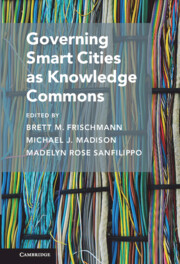21 results

Governing Smart Cities as Knowledge Commons
-
- Published online:
- 18 February 2023
- Print publication:
- 09 February 2023
-
- Book
-
- You have access
- Open access
- Export citation
Introduction
-
-
- Book:
- Governing Smart Cities as Knowledge Commons
- Published online:
- 18 February 2023
- Print publication:
- 09 February 2023, pp 1-5
-
- Chapter
-
- You have access
- Open access
- HTML
- Export citation
10 - A Proposal for Principled Decision-Making
- from Part IV - Lessons for Smart Cities
-
-
- Book:
- Governing Smart Cities as Knowledge Commons
- Published online:
- 18 February 2023
- Print publication:
- 09 February 2023, pp 295-308
-
- Chapter
-
- You have access
- Open access
- HTML
- Export citation
Conclusion
- from Part IV - Lessons for Smart Cities
-
-
- Book:
- Governing Smart Cities as Knowledge Commons
- Published online:
- 18 February 2023
- Print publication:
- 09 February 2023, pp 309-320
-
- Chapter
-
- You have access
- Open access
- HTML
- Export citation
1 - Smart Cities and Knowledge Commons
-
-
- Book:
- Governing Smart Cities as Knowledge Commons
- Published online:
- 18 February 2023
- Print publication:
- 09 February 2023, pp 6-26
-
- Chapter
-
- You have access
- Open access
- HTML
- Export citation
4 - Community Land Trusts as a Knowledge Commons
- from Part II - Polycentricity and Urban Data
-
-
- Book:
- Governing Smart Cities as Knowledge Commons
- Published online:
- 18 February 2023
- Print publication:
- 09 February 2023, pp 83-111
-
- Chapter
-
- You have access
- Open access
- HTML
- Export citation
Governance and human rights implications of ASEAN's Smart Cities Network: a knowledge commons analysis
-
- Journal:
- International Journal of Law in Context / Volume 19 / Issue 1 / March 2023
- Published online by Cambridge University Press:
- 28 September 2022, pp. 13-31
-
- Article
-
- You have access
- Open access
- HTML
- Export citation
Chapter 15 - The Intelligent Society
-
- Book:
- Cultural-Historical Perspectives on Collective Intelligence
- Published online:
- 03 February 2022
- Print publication:
- 20 January 2022, pp 399-418
-
- Chapter
-
- You have access
- Open access
- HTML
- Export citation
Chapter 12 - Intelligent Evaluations
-
- Book:
- Cultural-Historical Perspectives on Collective Intelligence
- Published online:
- 03 February 2022
- Print publication:
- 20 January 2022, pp 340-365
-
- Chapter
-
- You have access
- Open access
- HTML
- Export citation
4 - Common Sense Commons
-
-
- Book:
- Governing Markets as Knowledge Commons
- Published online:
- 09 December 2021
- Print publication:
- 16 December 2021, pp 113-132
-
- Chapter
- Export citation
6 - Property Rights, Knowledge Commons, and Blockchain Governance
-
-
- Book:
- Governing Markets as Knowledge Commons
- Published online:
- 09 December 2021
- Print publication:
- 16 December 2021, pp 159-175
-
- Chapter
- Export citation
Introduction
-
-
- Book:
- Governing Markets as Knowledge Commons
- Published online:
- 09 December 2021
- Print publication:
- 16 December 2021, pp 1-18
-
- Chapter
- Export citation
3 - Individual Sovereignty and Coproduction of Knowledge Governance
-
-
- Book:
- Governing Markets as Knowledge Commons
- Published online:
- 09 December 2021
- Print publication:
- 16 December 2021, pp 89-112
-
- Chapter
- Export citation
8 - Entrepreneurship and Governance in the Scotch Whisky Knowledge Commons
-
-
- Book:
- Governing Markets as Knowledge Commons
- Published online:
- 09 December 2021
- Print publication:
- 16 December 2021, pp 195-216
-
- Chapter
- Export citation
7 - Knowledge Commons, Social Infrastructures, and Informal Markets
-
-
- Book:
- Governing Markets as Knowledge Commons
- Published online:
- 09 December 2021
- Print publication:
- 16 December 2021, pp 176-194
-
- Chapter
- Export citation
10 - Crowdfunding the Queer Museum
-
-
- Book:
- Governing Markets as Knowledge Commons
- Published online:
- 09 December 2021
- Print publication:
- 16 December 2021, pp 238-255
-
- Chapter
- Export citation
4 - Averting Tragedy of the Resource Directory Anti-Commons
- from Part II - Averting New Tragedies
-
-
- Book:
- The Cambridge Handbook of Commons Research Innovations
- Published online:
- 29 October 2021
- Print publication:
- 11 November 2021, pp 45-54
-
- Chapter
- Export citation
26 - Internet Governance in the Digital Cold War
- from Part VIII - Technology, the Internet, and the Future of Commons Governance
-
-
- Book:
- The Cambridge Handbook of Commons Research Innovations
- Published online:
- 29 October 2021
- Print publication:
- 11 November 2021, pp 309-318
-
- Chapter
- Export citation
5 - Public Facebook Groups for Political Activism
- from Part I - Personal Information as a Knowledge Commons Resource
-
-
- Book:
- Governing Privacy in Knowledge Commons
- Published online:
- 29 March 2021
- Print publication:
- 25 March 2021, pp 121-148
-
- Chapter
-
- You have access
- Open access
- HTML
- Export citation
6 - The Republic of Letters and the Origins of Scientific Knowledge Commons
- from Part II - Privacy as Governance of Participation and Boundaries
-
-
- Book:
- Governing Privacy in Knowledge Commons
- Published online:
- 29 March 2021
- Print publication:
- 25 March 2021, pp 151-184
-
- Chapter
-
- You have access
- Open access
- HTML
- Export citation

